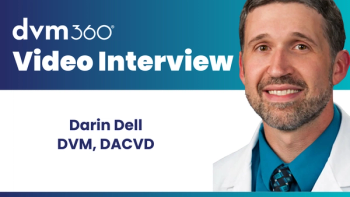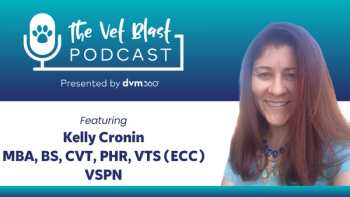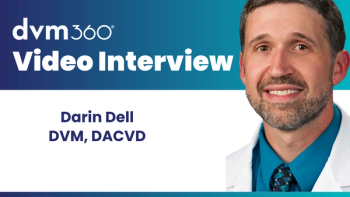
- Firstline December 2021
- Volume 16
- Issue 6
The future is bright for Galaxy Vets

CEO of Galaxy Vets, Ivan Zak, DVM, MBA, shares details of this new healthcare system, its mission to prevent burnout, and more insights on the company’s goals.
Ivan Zakharenkov “Zak,” DVM, MBA, the founder of 2 successful veterinary start-ups—Smart Flow and Veterinary Integration Solutions (VIS)—now has a resume that includes his role as the CEO of Galaxy Vets, a new employee- centered veterinary system dedicated to “giving veterinary medicine back to veterinarians” in the United States and eliminating burnout. “Our goal is to build a vertically integrated organization where people who do the actual work get a piece of the pie and directly benefit from its success. Unlike most consolidators, Galaxy Vets is founded, funded and run by vets,” Zak said in an interview with Firstline®.
Employee investment
With about 50 corporate groups active in North America, Zak said “[Galaxy Vets] decided to create an organization that is radically different than anything else.” The company is doing this by allocating equity in the network to its employees—veterinarians, specialists, technicians, and administrative personnel—who will also be considered co-owners and shareholders of the organization.
“[The] thing that differentiates [Galaxy Vets] is the mutual ownership model. Everybody in the organization not only [becomes] the shareholder, which is a financial gain, but also [has] a vote and a voice and [contributes to] the decisions of the company. The mechanism through which we’re providing ownership is called ESOP (employee stock option plan), which, by design, has to have the highest preference of shares that the employees are receiving,” Zak said.
“Some organizations provide some equity or bonuses to veterinarians [and] associates, [but] we’re going [to offer equity] in the entire organization. From management to veterinarians to ER vets who are working in the emergency locums and relief vets...and to customer service representatives and receptionists, so everybody gets shares in the organization,” he said. To facilitate this shared-by-all model, the company developed additional strategies, such as improving operations in the acquired practices, developing a unique value creation plan, and expanding the services beyond the brick
and mortar.
Burnout prevention
A key focus with Galaxy Vets is burnout prevention. When asked what he’s looking forward to most with the company, Zak’s answer was simple: “Happy people.” The inspiration derives from Zak’s personal experiences; struggling with mental health issues while working in emergency veterinary medicine.
“About...15 years ago, while in practice...I went into a pretty deep depression and [experienced] burnout...at that point, it felt like something I was ashamed of. I thought I was weak, that I couldn’t work days and days straight of emergency... but [within the] past 10 [to] 15 years, I realized this is a problem with the entire industry,” Zak said.
“It felt right to try to find a solution. A lot of people are looking for a solution and what to do when you [are] burned out,” he said. “[The veterinary practice] is actually an environment that can cause [burnout], so the prevention of it sits within the management. As I was studying in business school, I decided to focus on that as a thesis for my dissertation and further took it from dissertation to become a project.”
Zak emphasized that burnout demonstrates the end stage of general unhappiness of veterinarians, which is a result of various contributing factors. Galaxy Vets aims to combat this multifaceted issue by addressing the key challenges that veterinary professionals cite as a reason they consider leaving the profession, and eliminating the classic burnout triggers outlined by Christina Maslach, an American social psychologist known for her research on occupational burnout. Some of these factors include insufficient reward, lack of goals beyond graduation, work overload, and the toxic environment of handling dissatisfied clients who must spend excessive amounts of money on their sick pets.
Another cause of burnout he highlighted is “the management issues...which include the diversity and inclusion issues and workplace safety. Management is pushing people beyond the hours they should be working. The motivation through financial gain is not playing a good role in the whole environment. It’s a multiangled problem that we’re going to try to attack bit by bit by recognizing these issues. Our goal is zero economic euthanasias,” Zak said.
The future of Galaxy Vets
The short-term goal for Galaxy Vets is to create a model that could be replicated in anygeographic area. Because most businesses are expanding geographically from 1 location, the company is building a vertically integrated organization consisting of independent hubs—“solar systems,” as Zak described it.
“We have this space analogy. The entire organization is [a] galaxy; it’s comprised of “solar systems” consisting of a de novo- built specialty and emergency hospital (“Star”) surrounded by 10 general practices (“Planets”) within a small radius. So that’s 1 functional ecosystem in a vertically integrated unit, which we are kicking off right now in North Texas. The hope is to be able to expand that to about 200 [hospitals] across the country before we go to the IPO [initial public offering, when the company’s shares are traded on a stock exchange], but the long- term dream behind this endeavor is [to] create an environment in which people are happy,” Zak said.
“This could be replicated over and over, not only in North America, but in Europe and Australia—at least the English-speaking countries,” Zak said. “That’s a long-term vision and potentially through this system, retain the ownership of the domain within the hands of veterinarians.”
Conclusion
Zak remarked that obstacles exist within the veterinary industry because of a lack of veterinarians and geographical limitations, and he offered some advice on how companies can combat this by maximizing technology. “The pandemic really taught us how to work remotely. This is my fourth company I have built without any office, and we need it to really leverage technology, such as telemedicine,” he said.
Articles in this issue
about 4 years ago
Educating clients about common holiday hazardsover 4 years ago
Earning your team’s trust by adopting coaching techniquesNewsletter
From exam room tips to practice management insights, get trusted veterinary news delivered straight to your inbox—subscribe to dvm360.





